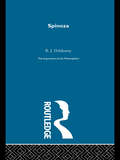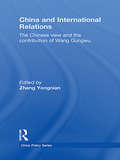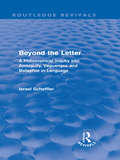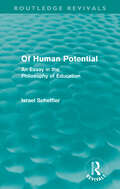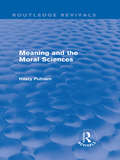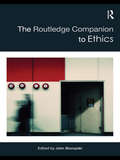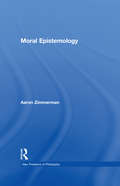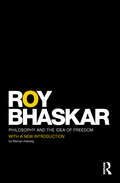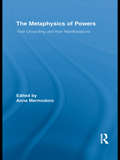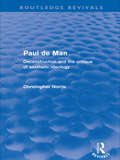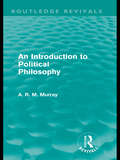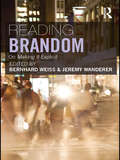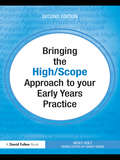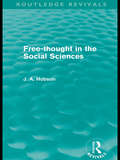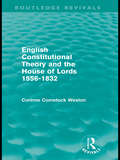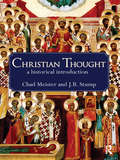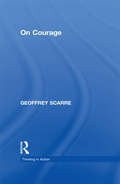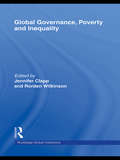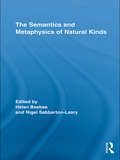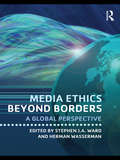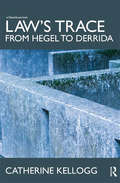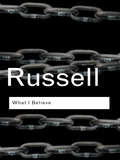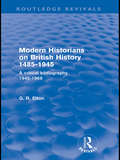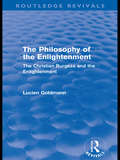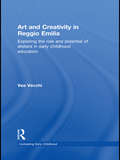- Table View
- List View
Spinoza-Arg Philosophers (Arguments Of The Philosophers Ser.)
by R.J. DelahuntyThis book is available either individually, or as part of the specially-priced Arguments of the Philosphers Collection.
China and International Relations: The Chinese View and the Contribution of Wang Gungwu (China Policy Series)
by Zheng YongnianDespite Beijing’s repeated assurance that China’s rise will be "peaceful", the United States, Japan and the European Union as well as many of China's Asian neighbours feel uneasy about the rise of China. Although China’s rise could be seen as inevitable, it remains uncertain as to how a politically and economically powerful China will behave, and how it will conduct its relations with the outside world. One major problem with understanding China’s international relations is that western concepts of international relations only partially explain China’s approach. China’s own flourishing, indigeneous community of international relations scholars have borrowed many concepts from the west, but their application has not been entirely successful, so the work of conceptualizing and theorizing China’s approach to international relations remains incomplete. Written by some of the foremost scholars in the field of China studies, this book focuses on the work of Wang Gungwu - one of the most influential scholars writing on international relations - including topics such as empire, nation-state, nationalism, state ideology, and the Chinese view of world order. Besides honouring Wang Gungwu as a great scholar, the book explores how China can be integrated more fully into international relations studies and theories; discusses the extent to which existing IR theory succeeds or fails to explain Chinese IR behaviour, and demonstrates how the study of Chinese experiences can enrich the IR field.
Beyond the Letter: A Philosophical Inquiry into Ambiguity, Vagueness and Methaphor in Language (Routledge Revivals)
by Israel SchefflerAmbiguity, vagueness and metaphor are pervasive features of language, deserving of systematic study in their own right. Yet they have frequently been considered mere deviations from ideal language or obstacles to be avoided in the construction of scientific systems. First published in 1979, Beyond the Letter offers a consecutive study of these features from a philosphical point of view, providing analyses of each and treating their relations to one another. Addressed to the fundamental task of logical and semantic explanation, the book employs an inscriptional methodology in the attempt to avoid prevalent forms of question-begging, and, further, in the conviction that sparseness of assumption often reveals points of theoretical interest irrespective of methodolgical preference. The author distinguishes and analyses several varieties of ambiguity, developing new semantic notions in the process; recasts the philosophical treatment of vagueness in the light of recent criticisms of analyticity; discusses the bearing of vagueness on logic; and provides a systematic critique of major recent interpretations of metaphor, developing a revised version of contextualism.
Of Human Potential: An Essay in the Philosophy of Education (Routledge Revivals)
by Israel SchefflerThe concept of potential plays a prominent role in the thinking of parents, educators and planners the world over. Although this concept accurately reflects central features of human nature, its current use perpetuates traditional myths of fixity, harmony and value, calculated to cause untold mischief in social and educational practice. First published in 1985, Israel Scheffler's book aims to demythologise the concept of potential. He shows its roots in genuine aspects of human nature, but at the same time frees it from outworn philosophical myths by means of analytical reconstruction - thereby improving both its theoretical and its practical applicability. The book concludes with an interpretation of policy-making in education, and reflections on the ideal education of a policy-maker. It emphasises human symbolism, choice, temporal continuity, and self-determination as indispensible elements of any adequate philosophy of education. Of Human Potential will be of interest to a broad range of philosophers, educators and social scientists.
Meaning and the Moral Sciences (Routledge Revivals)
by Hilary PutnamFirst published in 1978, this reissue presents a seminal philosophical work by professor Putnam, in which he puts forward a conception of knowledge which makes ethics, practical knowledge and non-mathematic parts of the social sciences just as much parts of 'knowledge' as the sciences themselves. He also rejects the idea that knowledge can be demarcated from non-knowledge by the fact that the former alone adheres to 'the scientific method'. The first part of the book consists of Professor Putnam's John Locke lectures, delivered at the University of Oxford in 1976, offering a detailed examination of a 'physicalist' theory of reference against a background of the works of Tarski, Carnap, Popper, Hempel and Kant. The analysis then extends to notions of truth, the character of linguistic enquiry and social scientific enquiry in general, interconnecting with the great metaphysical problem of realism, the nature of language and reference, and the character of ourselves.
The Routledge Companion to Ethics (Routledge Philosophy Companions)
by John SkorupskiThe Routledge Companion to Ethics is an outstanding survey of the whole field of ethics by a distinguished international team of contributors. Over 60 chapters are divided into six clear sections: the history of ethics meta-ethics perspectives from outside ethics ethical perspectives morality debates in ethics. The Companion opens with a comprehensive historical overview of ethics, including chapters on Plato, Aristotle, Hume, and Kant, and ethical thinking in China, India and the Arabic tradition. The second part covers the domain of meta-ethics. The third part covers important challenges to ethics from the fields of anthropology, psychology, sociobiology and economics. The fourth and fifth sections cover competing theories of ethics and the nature of morality respectively, with entries on consequentialism, Kantian morality, virtue ethics, relativism, evil, and responsibility amongst many others. A comprehensive final section includes the most important topics and controversies in applied ethics, such as rights, justice and distribution, the end of life, the environment, poverty, war and terrorism. The Routledge Companion to Ethics is a superb resource for anyone interested in the subject, whether in philosophy or related disciplines such as politics, education, or law. Fully indexed and cross-referenced, with helpful further reading sections at the end of each chapter, it is ideal for those coming to the field of ethics for the first time as well as readers already familiar with the subject.
Moral Epistemology (New Problems of Philosophy)
by Aaron ZimmermanHow do we know right from wrong? Do we even have moral knowledge? Moral epistemology studies these and related questions about our understanding of virtue and vice. It is one of philosophy’s perennial problems, reaching back to Plato, Aristotle, Aquinas, Locke, Hume and Kant, and has recently been the subject of intense debate as a result of findings in developmental and social psychology. In this outstanding introduction to the subject Aaron Zimmerman covers the following key topics: What is moral epistemology? What are its methods? Including a discussion of Socrates, Gettier and contemporary theories of knowledge skepticism about moral knowledge based on the anthropological record of deep and persistent moral disagreement, including contextualism moral nihilism, including debates concerning God and morality and the relation between moral knowledge and our motives and reasons to act morally epistemic moral scepticism, intuitionism and the possibility of inferring ‘ought’ from ‘is,’ discussing the views of Locke, Hume, Kant, Ross, Audi, Thomson, Harman, Sturgeon and many others how children acquire moral concepts and become more reliable judges criticisms of those who would reduce moral knowledge to value-neutral knowledge or attempt to replace moral belief with emotion. Throughout the book Zimmerman argues that our belief in moral knowledge can survive sceptical challenges. He also draws on a rich range of examples from Plato’s Meno and Dickens’ David Copperfield to Bernard Madoff and Saddam Hussein. Including chapter summaries and annotated further reading at the end of each chapter, Moral Epistemology is essential reading for all students of ethics, epistemology and moral psychology.
Philosophy and the Idea of Freedom (Classical Texts in Critical Realism (Routledge Critical Realism))
by Roy BhaskarFirst published in 2011. Routledge is an imprint of Taylor & Francis, an informa company.
The Metaphysics of Powers: Their Grounding and their Manifestations (Routledge Studies In Metaphysics Ser. #2)
by Anna MarmodoroThis volume is a collection of papers that advance our understanding of the metaphysics of powers — properties such as fragility and electric charge. The metaphysics of powers is a fast developing research field with fundamental questions at the forefront of current research, such as Can there be a world of only powers? What is the manifestation of a power? Are powers and their manifestations related by necessity? What are the prospects for dispositional accounts of causation? The papers focus on questions concerning the metaphysics of powers that cut across any particular subject-specific ontological domain -- whether philosophy of science, philosophy of mind, ethics, epistemology – investigating the metaphysical structure of powers, the nature of the manifestation of powers, the necessity or contingency of a power’s relation to its manifestations, and powers and causation. A number of authors also engage in discussion with Humean and neo-Humean treatments of causation, thereby making contributions to a larger metaphysical debate beyond powers. Additionally, the authors engage critically with the latest contributions to the debate on powers in the literature, thereby bringing together in a wholesome and analytical way the most recent and noteworthy theoretical developments in this research field.
Paul de Man: Deconstruction and the Critique of Aesthetic Ideology (Routledge Revivals)
by Christopher NorrisPaul de Man - literary critic, literary philosopher, "American deconstructionist" - changed the landscape of criticism through his rigorous theories and writings. Upon its original publication in 1988, Christopher Norris' book was the first full-length introduction to de Man, a reading that offers a much-needed corrective to the pattern of extreme antithetical response which marked the initial reception to de Man's writings. Norris addresses de Man's relationship to philosophical thinking in the post-Kantian tradition, his concern with "aesthetic ideology" as a potent force of mystification within and beyond that tradition, and the vexed issue of de Man's politics. Norris brings out the marked shift of allegiance in de Man's thinking, from the thinly veiled conservative implications of the early essays to the engagement with Marx and Foucault on matters of language and politics in the late, posthumous writing. At each stage, Norris raises these questions through a detailed close reading of individual texts which will be welcomed by those who lack any specialised knowledge of de Man's work.
An Introduction to Political Philosophy (Routledge Revivals)
by A. R. MurrayFirst published in 1953, this seminal introduction to political philosophy is intended for both the student of political theory and for the general reader. After an introduction which explains the nature and purpose of philosophy, Dr Murray provides a critical examination of the principle theories advanced by political philosophers from Plato to Marx, paying special attention to contemporary issues. The book also makes an attempt to define the essential issues of philosophical significance in contemporary politics, with special reference to the conflict between political authority and individual rights, and to show how the different moral assumptions underlying authoritarian and democratic systems of government are ultimately based upon different theories of logic.
Reading Brandom: On Making It Explicit
by Bernhard WeissRobert Brandom’s Making It Explicit: Reasoning, Representing and Discursive Commitment is one of the most significant, talked about and daunting books published in philosophy in recent years. Featuring specially-commissioned chapters by leading international philosophers with replies by Brandom himself, Reading Brandom clarifies, critically appraises and furthers understanding of Brandom’s important book. Divided into four parts - ‘Normative Pragmatics’; ‘The Challenge of Inferentialism’; ‘Inferentialist Semantics’; and ‘Brandom’s Replies’, Reading Brandom covers the following key aspects of Brandom’s work: inferentialism vs. representationalism normativity in philosophy of language and mind pragmatics and the centrality of asserting language entries and exits meaning and truth semantic deflationism and logical locutions. Essential reading for students and scholars of philosophy of language and mind, Reading Brandom is also an excellent companion volume to Reading McDowell: On Mind and World, also published by Routledge.
Bringing the High Scope Approach to your Early Years Practice (Bringing ... to your Early Years Practice)
by Nicky HoltHave you ever wondered what High/Scope is, where it came from, and how it can be used with young children in your setting? Bringing the High Scope Approach to your Early Years Practice provides an introduction to the High/Scope philosophy and its use in early years. This new edition has been fully updated to show how the High/Scope approach links with the Early Years Foundation Stage and contains new material on working with the under twos. Features include: details about the High/Scope Wheel of Learning an explanation of Active Learning, including materials, manipulation, choice, language and support Plan-Do-Review activities planning and assessment methods. This convenient guide will help Early Years practitioners, students and parents to really understand what the High/Scope approach can offer their setting and children.
Free-Thought in the Social Sciences (Routledge Revivals)
by J. A. HobsonThis Routledge Revival sees the reissue of a seminal work by British economist, sociologist and academic John A. Hobson, elucidating his views on a variety of topics across the social sciences. He makes particular reference to the struggle between the disinterested urge of the social scientist and the interests and other motive forces which tend to influence and mould his processes of inquiry. The work is split into three parts, focussing upon free-thinking, economics and political ethics respectively.
English Constitutional Theory and the House of Lords 1556-1832 (Routledge Revivals)
by Corinne WestonFirst published in 1965, this work studies the House of Lords and the various proposals for its reform, abolition or limitation of its powers which have been made in the light o f prevailing theories of the nature and characteristics of the English government. The work also contains a history of the theory of mixed government that arose in Tudor England and lasted until well after the Reform Act of 1832. This history both illuminates the position of the House of Lords and also provides perspective for the study of Democracy in the movement for parliamentary reform. One of the book's most original features is an extensive account of Charles I's Answer to the Nineteen Propostions, out of which came the startling new theory of the constitution, known as "mixed monarchy".
Christian Thought: A Historical Introduction
by Chad Meister James StumpThe story of Christian thought is essential to understanding Christian faith today and the last two millennia of world history. This fresh and lively introduction explores the central ideas, persons, events, and movements that gave rise to Christian thought, from early beginnings to its present forms. By highlighting the important but often neglected role of women and the influence of non-Christian ideas and movements, this book provides a broader context for understanding the history of Christian ideas and their role in shaping our world. This work chronicles the impressive developments of Christian thinking which arose from these contexts and have transcended the ages. Christian Thought: provides an overview of the context of Christianity’s origin, including discussion of the influence of Hebrews, Greeks, and Romans in the ancient world and the founding figures of Jesus and Paul explores the major events and figures of the history of Christian thought, while drawing attention to significant voices which have often been suppressed analyses the impact on Christian thought of widely discussed events such as The Great Schism, the Scientific Revolution, and Modernism surveys contemporary trends such as fundamentalism, feminism, and postmodernism. Complete with illustrations, timelines and maps, this is an ideal resource for anyone wanting to learn more about the development of Christian thought and its influence over the centuries.
On Courage (Thinking in Action)
by Geoffrey ScarreWhat is courage and why is it one of the oldest and most universally admired virtues? How is it relevant in the world today, and what contemporary forms does it take? In this insightful and crisply written book, Geoffrey Scarre examines these questions and many more. He begins by defining courage, asking how it differs from fearlessness, recklessness and fortitude, and why people are often more willing to ascribe it to others than to avow it for themselves. He also asks whether courage can serve bad ends as well as good, and whether it can sometimes promote confrontation over compromise and dialogue. On Courage explores the ideas of Aristotle, Aquinas and many later philosophers who have written about courage, as well as drawing on classic and recent examples of courage in politics and fiction, including the German anti-Nazi "White Rose Movement", the modern phenomenon of "whistle-blowing", and Stephen Crane’s The Red Badge of Courage.
Global Governance, Poverty and Inequality (Global Institutions)
by Jennifer ClappA series of crises unfolded in the latter part of the first decade of the 21st Century which combined to exacerbate already profound conditions of global economic inequality and poverty in the world’s poorest countries. In 2007, the unsound lending practices that caused a collapse in the US housing market ushered in a broader economic crisis that reverberated throughout the global financial system. This economic shockwave had a global impact, triggering not just instability in other industrialized countries, but also in their developing world counterparts, also highlighting deficiencies in the current structures of global governance to protect the world’s poorest and most disadvantaged. This book offers answers to questions raised about the role of global governance in the attenuation and amelioration of world poverty and inequality. The contributors interrogate the role of systems of governance at a time of global economic crisis and continuing environmental degradation against a backdrop of acceleration in inequalities within and between communities and across the globe. Evaluating how existing systems can be reformed or redesigned to be more effective at addressing issues of poverty and inequality and providing a comprehensive discussion of a wide range of global governance initiatives this work will be essential reading for students and scholars of global governance, international relations and international organizations.
The Semantics and Metaphysics of Natural Kinds (Routledge Studies In Metaphysics Ser. #1)
by Helen BeebeeEssentialism--roughly, the view that natural kinds have discrete essences, generating truths that are necessary but knowable only a posteriori--is an increasingly popular view in the metaphysics of science. At the same time, philosophers of language have been subjecting Kripke’s views about the existence and scope of the necessary a posteriori to rigorous analysis and criticism. Essentialists typically appeal to Kripkean semantics to motivate their radical extension of the realm of the necessary a posteriori; but they rarely attempt to provide any semantic arguments for this extension, or engage with the critical work being done by philosophers of language. This collection brings authors on both sides together in one volume, thus helping the reader to see the connections between views in philosophy of language on the one hand and the metaphysics of science on the other. The result is a book that will have a significant impact on the debate about essentialism, encouraging essentialists to engage with debates about the semantic presuppositions that underpin their position, and, encouraging philosophers of language to engage with the metaphysical presuppositions enshrined in Kripkean semantics.
Media Ethics Beyond Borders: A Global Perspective
by Stephen J.A. WardThis volume explores the construction of an ethics for news media that is global in reach and impact. Essays by international media ethicists provide leading theoretical perspectives on major issues and applies the ideas to specific countries, contexts and problems, addressing such questions as: Are there universal values in journalism? How would a global media ethics do justice to the cultural, political, and economic differences around the world? Can a global ethic based on universal principles allow for diversity of media systems and cultural values? What should be the principles and norms of practice of global media ethics? The result is a rich source of ethical thought and analysis on questions raised by contemporary global media.
Law's Trace: From Hegel to Derrida
by Catherine KelloggLaw's Trace argues for the political importance of deconstruction by taking Derrida’s reading of Hegel as its point of departure. While it is well established that seemingly neutral and inclusive legal and political categories and representations are always, in fact, partial and exclusive, among Derrida’s most potent arguments was that the exclusions at work in every representation are not accidental but constitutive. Indeed, one of the most significant ways that modern philosophy appears to having completed its task of accounting for everything is by claiming that its foundational concepts – representation, democracy, justice, and so on – are what will have always been. They display what Derrida has called a "fabulous retroactivity." This means that such forms of political life as liberal constitutional democracy, capitalism, the rule of law, or even the private nuclear family, appear to be the inevitable consequence of human development. Hegel’s thought is central to the argument of this book for this reason: the logic of this fabulous retroactivity was articulated most decisively for the modern era by the powerful idea of the Aufhebung – the temporal structure of the always-already. Deconstruction reveals the exclusions at work in the foundational political concepts of modernity by ‘re-tracing’ the path of their creation, revealing the ‘always-already’ at work in that path. Every representation, knowledge or law is more uncertain than it seems, and the central argument of Law's Trace is that they are, therefore, always potential sites for political struggle.
What I Believe (Routledge Classics)
by Bertrand RussellAlong with Why I Am Not a Christian, this essay must rank as the most articulate example of Russell's famed atheism. It is also one of the most notorious. Used as evidence in a 1940 court case in which Russell was declared unfit to teach college-level philosophy, What I Believe was to become one of his most defining works. The ideas contained within were and are controversial, contentious and - to the religious - downright blasphemous. A remarkable work, it remains the best concise introduction to Russell's thought.
Modern Historians on British History 1485-1945: A Critical Bibliography 1945-1969 (Routledge Revivals)
by G.R. EltonThe twenty-five year period following the Second World War saw an enormous expansion of activity in the writing of the history of modern Britain, and with that expansion a major transformation of the state of knowledge in many parts of the area. First published in 1970, this Revivals reissue, which includes an extensive coverage of books and a reasonable selection of articles, endeavours both to survey the work done and to reduce it to some comprehensible order. It indicates achievements and probable lines of development, and collects the materials that have grown around the main controversies. Omitted are local history (in the main) and the history of empire and commonwealth, except where the latter really arises out of the affairs of the mother country. There are special sections on social history, the history of ideas, Scotland and Ireland.
The Philosophy of the Enlightenment: The Christian Burgess and the Enlightenment (Routledge Revivals)
by Lucien GoldmannIn this reissue, originally published in English in 1973, French philosopher Lucien Goldmann turns his attention to the Enlightenment of the eighteenth century, the great age of liberalism and individualism and analyses the ‘mental structures’ of the outlook of the philosophes, who showed that the ancien regime and the privileges of the Church were irrational anachronisms. In assessing the strengths and limitations of individualism, Goldmann considers the achievements and limitations of the Enlightenment. He discusses the views of Hegel and Marx and examines the relation between liberal scepticism and traditional Christianity to point the way to the possible reconciliation of the two seemingly incompatible ‘world visions’ of East and West today.
Art and Creativity in Reggio Emilia: Exploring the Role and Potential of Ateliers in Early Childhood Education (Contesting Early Childhood)
by Vea VecchiThis book explores the contribution of and art and creativity to early education, and examines the role of the atelier (an arts workshop in a school) and atelierista (an educator with an arts background) in the pioneering pre-schools of Reggio Emilia. It does so through the unique experience of Vea Vecchi, one of the first atelieristas to be appointed in Reggio Emilia in 1970. Part memoir, part conversation and part reflection, the book provides a unique insider perspective on the pedagogical work of this extraordinary local project, which continues to be a source of inspiration to early childhood practitioners and policy makers worldwide. Vea’s writing, full of beautiful examples, draws the reader in as she explains the history of the atelier and the evolving role of the atelierista. Key themes of the book include: • processes of learning and knowledge construction • the theory of the hundred languages of childhood and the role of poetic languages • the importance of organisation, ways of working and tools, in particular pedagogical documentation • the vital contribution of the physical environment • the relationship between the atelier, the atelierista, the school and its teachers This enlightening book is essential reading for students, practitioners, policy makers and researchers in early childhood education, and also for all those in other fields of education interested in the relationship between the arts and learning.
